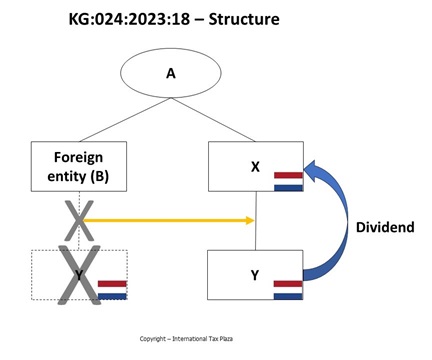On November 7, 2023 on the website of the Dutch tax authorities a position paper of the knowledge group dividend withholding tax and withholding taxes of the tax authorities on the definition of ultimate beneficial owner with respect to the anti-dividend stripping regulations was published (KG:024:2023:18). This position paper is interesting to read because it relates to group restructurings.
Facts
A natural person (A) living abroad directly holds all shares in a foreign entity (B) that on its turn holds all shares in a Dutch entity (Y). Furthermore this natural person directly holds all shares in another Dutch entity (X).
Through a number of steps, the shares in Y are transferred from the foreign entity to Dutch X. Shortly after this transfer, Y distributes/pays a dividend to X.

Question
Can on the basis of Article 4, Paragraphs 7 and 8 of the Dutch dividend withholding tax Act (hereinafter: DDWT Act) the position be taken that a person entitled to the (dividend) proceeds is not the ultimate beneficial owner if the original, direct shareholder (the foreign entity) does no longer possess an (in-)direct interest in the distributing/paying entity (Y)?
Answer
No, Article 4, Paragraphs 7 and 8 of the DDWT Act do not apply here, because the original, direct shareholder (the foreign entity) does not directly or indirectly maintain or acquire a position in shares that is comparable to his position in similar shares at the moment prior to the set of transactions.

From the considerations of the tax authorities
Based on Article 4, Paragraph 4 of the DDWT Act the withholding exemption does not apply if the beneficiary of the proceeds is not the ultimate beneficial owner.
Pursuant to Article 4, Paragraph 7 of the DDWT Act, in any case the following shall not be regarded as the ultimate beneficial owner:
“the person who has performed a consideration as part of a series of legal transactions in connection with the proceeds received in which it is likely that:
a. the proceeds have benefited in whole or in part, directly or indirectly, to:
1. a natural person or a legal entity in respect of whom withholding may not be omitted, while this is permitted in respect of the person that has provided the consideration, or
2. a natural person or legal entity that is less entitled to a reduction or refund of dividend withholding tax than the person that provided the consideration; and
b. this natural person or legal entity directly or indirectly maintains or acquires a position in shares, profit-sharing certificates or loans as referred to in Article 10, Paragraph 1 under d of the Dutch corporate income tax Act that is comparable to its position in similar shares, profit-sharing certificates or loans prior to the moment at which the series of transactions commenced."
From parliamentary history it can be deduced that the assessment whether a direct or indirect interest is retained must take place at the level of the original, direct shareholder. In this case the foreign entity.
The foregoing means that in the underlying case the withholding exemption of Article 4, Paragraph 1 of the DDWT Act applies to the dividend payment from Y to X. has indirectly retained no interest. Article 4, Paragraph 7 of the DDWT Act does not apply since the foreign entity did not maintain a direct, nor an indirect, interest.
Other position papers of the Knowledge group dividend withholding tax and withholding taxes that we have reported on earlier can be found here.
Copyright – internationaltaxplaza.info
Follow International Tax Plaza on Twitter (@IntTaxPlaza)





